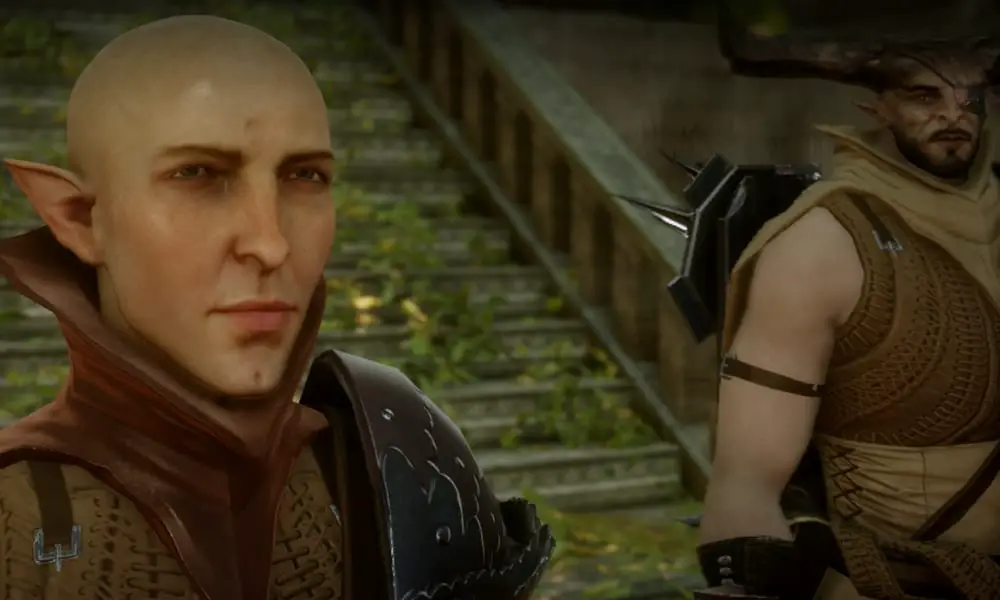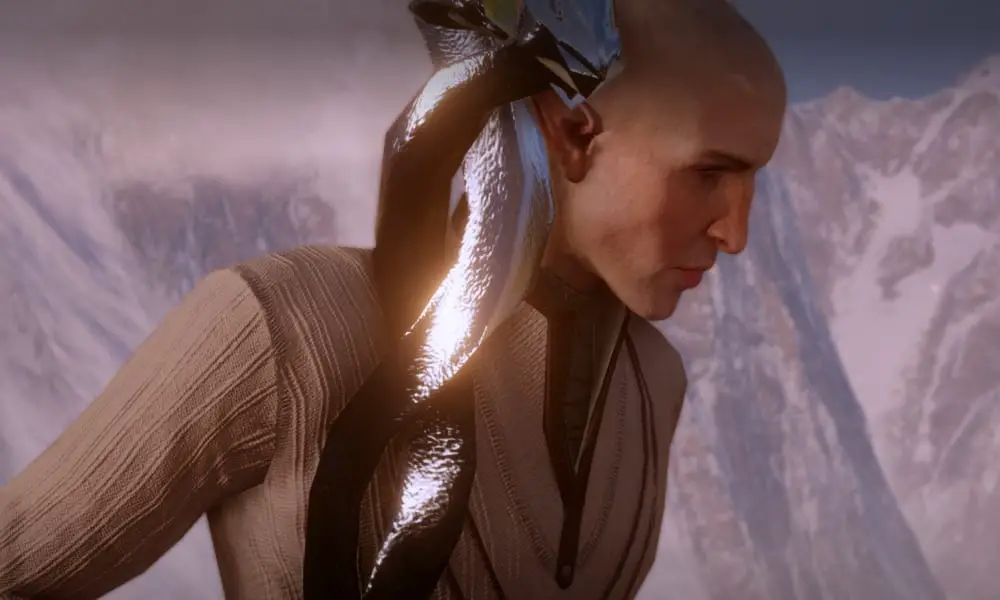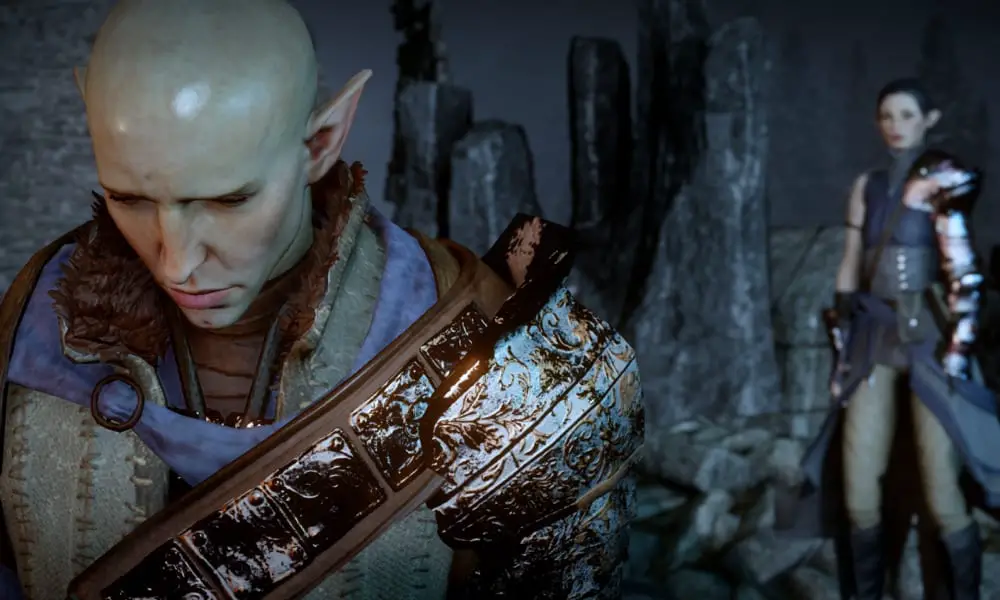Spoiler Warning for all of Dragon Age: Inquisition
Cole: You didn’t do it to be right. You did it to save them.
There’s no question that Bioware’s Dragon Age universe is popular, in part, because it is so immersive, gorgeously rendered, and inclusive. Most of all, however, I think it inspires so many deep emotions because of the rich, complex characters that fans passionately love and hate—like Anders, Loghain, The Iron Bull, Isabela, Sera, and more. Nowhere is this level of emotional response more visible, however, than with the character of Solas, the Dragon Age: Inquisition (DAI) companion who is ultimately revealed to be the elven god Fen’Harel and our unexpected adversary.
I was reminded of this again because of a recent feature written by Gita Jackson for Kotaku. Entitled “It’s Been Three Years and I Still Hate Solas,” it’s presented as a sly tribute to “one of the best-written characters in video games” (which: agreed). Ironically, however, it also devolves immediately into a long list of the emotional reasons Jackson loathes Solas and the ways in which she’d like to kill him.
It’s a fun piece—Jackson’s a vivid, witty writer who obviously loves the DAI world.
She’s just wrong.
Making the Case
I’m not arguing against hating Solas—we all have characters we love and loathe, and Solas’s deeds certainly merit any number of intense reactions. My main problem with Jackson’s piece is rather that she seems to hate him on a purely subjective, emotional level that I believe abandons logic. Her reasons for hating Solas are legion (and entertaining).
She starts with the most fabulous description possibly ever written about him (that he’s an “egg-lookin’ ass motherfucker”) then proceeds through her grievances from there.
(Side note: Given the fact that nobody will ever top Jackson’s description here, can we finally retire the “egg” references? I mean, okay, Solas is bald. But we’re not twelve. Why don’t we, to quote a certain anthem, let it go?)
Meanwhile, Jackson points out that Solas is a reticent, condescending, smug, passive-aggressive, superior, arrogant, racist asshole who is unfairly critical of both the Qun (the repressive pseudo-fascist religious/political system espoused by the Qunari) and The Grey Wardens (the secretive warrior brotherhood that actually ingests darkspawn blood to fight the Blight). But it’s mostly about the fact that he’s a know-it-all ass. Some more.
I think that’s basically it.
The Vicious Circle
For me, what’s frustrating about Jackson’s take isn’t that it boils down to “Solas is an asshole.” Rather, it’s that she praises his complexity, yet the entire essay ignores that complexity and paints him as an egotistical, two-dimensional tool, disregarding the moments in which he actually demonstrates humility, compassion, or self-awareness.
Part of this is due to the self-fulfilling nature of RPG gameplay. I’ve heard a lot of people say, “I don’t like Solas so I leave him alone.” The problem is, if you don’t talk to Solas, interactions are antagonistic, and ultimately garner low approval with him. You’ll not only miss out on the other sides of his character, you’ll also lose access to vital dialogue and information affecting your understanding of the entire game story. Solas himself (when you do talk to him), meanwhile, will retreat into his early guarded superiority without showing any of the growth he demonstrates with a friendly or romanced Inquisitor. (From her essay, it’s apparent that Jackson played a romanced storyline with Solas at least once, but that still leaves room for a lot of missed content depending on choices.)
Pride and Arrogance
Next, let’s look at Solas’s arrogance. Solas’s name literally means “pride” in the elven language, so it’s no wonder that he lives up to his name—especially at the beginning of DAI. However, this pride is also revealed over the eighteen months of in-universe story time to follow as a mask for regret, despair, doubt, and self-recrimination. When we first meet him, Solas is an intensely lonely man who has spent a year trying to come to terms with the waking nightmare he caused. In putting up the Veil, he sealed away the would-be gods who had enslaved his people, filled lakes with the blood of the dead, and sought to conquer the world. It was an undeniably heroic act, but it also directly caused the downfall of the very people Solas was trying to save, and in trying to undo this upon awakening, Solas resorted to his first unequivocally evil deed—manipulating Corypheus into unlocking the Orb (although, to be fair, he thought it would simply kill Corypants, not unleash a rain of demons across Thedas).
Solas’s arrogance was forged across a life that previously spanned centuries, and his pride is both his greatest strength and fatal flaw. That pride allowed him to dare great things: to free the slaves, to rebel against tyrants, and to shake the world of Thedas to its foundations. If you want to get Biblical, Solas’s pride actually enabled him to outdo Lucifer himself: Faced with the wars and corruptions of the Evanuris above and Forgotten ones below, he didn’t choose either heaven or hell, and instead made the wholly breathtaking and original choice to lock BOTH parties away.
At Haven, therefore, Solas is still licking his wounds and recovering from his awakening the year before. At first, he’s cold and dismissive (I personally feel he’s still suffering from PTSD, which I think also directly contributed to his brutal actions in the excellent Patrick Weekes novel The Masked Empire). However, the Inquisition changes him. He calms down, forges friendships, makes jokes, shows vulnerability, and falls in love with the world—even this pale and muted one. As beautifully played by voice actor Gareth David-Lloyd (“Torchwood“), Solas is increasingly moved by the courage of the people he encounters, and although Jackson’s essay is dependent on Solas as a know-it-all, he actually begins to question his assumptions (especially if romanced), openly admitting that he was wrong not once but several times. To me, those moments of genuine humility are essential to understanding his character.
I like that Solas begins in arrogance—it’s appropriate and ironic, especially as his journey—by the time of his final, crucial meeting with Flemeth—ends in penitence, guilt and grief. Yes, he’s smarter than most. But he’s also a prisoner of his own tunnel vision. He can’t think his way out of the problem he helped to create (however good his intentions at the time). He is trapped once again, solitary and without solace. His mistake affected lives uncounted. Undoing that mistake will do the same. So he’s already damned no matter what he does. (It may be tragic, but wow, it’s great drama.)

The Rebel God
Another of the key behaviors for which Jackson judges Solas are his debates with The Iron Bull about life under the Qun. As presented by Jackson, Bull is just “a nice guy” trying to defend his way of life, while Solas is being a superior asshole who can’t leave other people’s accepted ideals alone.
Except… (cough), not so fast. Look, I love Bull. He’s my favorite character in all of Dragon Age: Inquisition. But Bull’s not exactly Rebecca of Sunnybrook Farm, here, or the nice uncomplicated guy Jackson is painting him to be. In actuality, Bull is a deceptively superb spy hiding in plain sight—a guy whose title of “Hissrad” under the Qun literally means “liar.” Until we gain his loyalty mid-story, Bull is present under direct orders from the Qun, with the goal (it’s heavily implied) of infiltrating the Inquisition and placing himself in a position advantageous to the Qunari and their agenda of world domination.
In other words, when Bull debates Solas about life under the Qun (conversations Bull frequently initiates, by the way, not Solas), he is actively speaking pro-Qun propaganda, and he is doing so as a member of the Ben-Hassrath (roughly the Qunari equivalent of the Gestapo), under whose umbrella he has killed and captured many attempting to flee the Qun (and go “Tal-Vashoth”), and submitted still others to forcible brainwashing under the Qunari re-educators. Bull’s such a true believer, in fact, that at one point, he even turned himself over to them for brainwashing after PTSD, willing for them to “fix” him. So no, Bull’s not being genial with Solas here out of niceness (at least, not solely)—he’s doing it because he is cultivating relationships for potential exploitation under the Qun, at least until his loyalty is gained and he’s brave enough to leave for good.
With this in mind, it’s not only appropriate for Solas to question Bull’s casual acceptance of the Qun, it would be grossly out of character for him not to do so. In DAI, even before the “Trespasser” DLC, we are aware that Solas is a champion of free will and a rebel against tyranny or enslavement (and he says as much openly in a speech to Cassandra). So when Jackson says that Bull “goes out of his way” to note that the Qun’s goal of assimilation isn’t worth the carnage, I have to point out that, in fact, Bull only expresses this after Solas pushes him to admit that many of their friends in the Inquisition, in fact, would not survive such a scenario.
Lastly, Solas doesn’t even get credit for being supportive of Bull if he does leave the Qun and go rogue (or “Tal-Vashoth”). When Solas congratulates Bull for the decision and offers friendship later (in a rare moment for Solas), he’s still criticized as “smarmy” and disingenuous. (Jackson then completely omits any mention of the way Solas backs this up with the friendly, extended game of mind-chess to help distract Bull from his pain and self-doubt, and which for me constitutes some of the best and most subtle writing in the game.)

Yearnings for Forgotten Glories
Similarly, the situations in which Solas talks to Varric about the dwarven people and their fall from grace are again simplistically presented as yet more scenarios in which to paint Solas as dismissive and superior.
However, to me, Jackson is missing a key and tragic aspect here: in calling their remaining people a “severed arm,” Solas isn’t mocking the loss of the dwarves, he is mourning it, seeing it in direct parallel to the fall of his own people. Unlike Solas, Varric is not a survivor who awakened to a shattered vision of the people he loved, and he can dismiss his own lost empire as a faded myth, rather than as the vivid and immediate memory Solas carries with him like a wound:
Varric: All the “fallen empire” crap you go on about. What’s so great about empires anyway? So we lost the Deep Roads, and Orzammar’s too proud to ask for help. So what? We’re not Orzammar and we’re not our empire. There are tens of thousands of us living up here in the sunlight now, and it’s not that bad. Life goes on. It’s just different than it used to be.
Solas: And you have no concept of what that difference cost you.
Varric: I know what it didn’t cost me. I’m still here, even after all those thaigs fell.
After a little thought, however, Solas later apologizes, and Varric even gets him to admit that he may have been wrong about judging a man who gave in to his solitude without fighting it:
Varric: That’s the world. Everything you build, it tears down. Everything you’ve got, it takes. And it’s gone forever. The only choices you get are to lie down and die or keep going. He kept going. That’s as close to beating the world as anyone gets.
Solas: Well said. Perhaps I was mistaken.
Romancing the Moron
Jackson’s final criticism of Solas primarily involves his romance with the Inquisitor, which she basically describes as a reluctant coupling of an arrogant god with the moronic backwoods Dalish twit he barely considers worth the effort.
As before, Solas’s early arrogance and reticence are treated as static elements that do not evolve throughout the romance, along with repeated assertions that Solas constantly thinks he knows everything and is right all the time, and again, this just isn’t the case.
Yes, Solas is prickly in his first few conversations with a Dalish Inquisitor, especially on Dalish culture and customs, for which there is a very specific and hidden reason—the Dalish had previously turned Solas away when he went to them for help after his awakening—a denial that stung him bitterly. However, if the Inquisitor responds with a respectful request for him to use his knowledge to help rectify the ignorance of her Dalish clan, Solas immediately apologizes, offering assistance and support. As the romance proceeds, Solas will go on to repeatedly question his early judgment of the Dalish, expressing doubt and regret for his previous comments depending on your response.
Finally, there’s this key banter dialogue with Cole, with Solas blatantly admitting to his own mistakes and ignorance:
Cole: They are not gone so long as you remember them.
Solas: I know.
Cole: But you could let them go.
Solas: I know that as well.
Cole: You didn’t do it to be right. You did it to save them.
Inquisitor: Solas, what is Cole talking about?
Solas: A mistake. One of many made by a much younger elf who was certain he knew everything.
Cole: You weren’t wrong, though.
Solas: Thank you, Cole.

A Question of the Spirit
A final key moment that I believe Jackson misrepresents in her analysis is the conversation where Solas talks to the Inquisitor about the transference of the Anchor from the Orb itself. Jackson sees the moment when Solas asks the Inquisitor if it changed them in any way (“Your mind, your morals, your… spirit?”) as simply yet another sign that Solas thinks the Inquisitor to be so mentally and racially inferior that he’s now wondering if maybe contact with the Orb is what made them special at all.
For me, the obvious answer is much more interesting here: Solas isn’t asking the Inquisitor this question because he’s still amazed she’s able to walk and chew gum at the same time, but rather because he is literally trying to discover if the Orb (the Orb of Fen’Harel, that is tied to his personal magic and spirit, albeit unknown to her) has changed her awareness or even perhaps connected her spirit to his.
For Solas, whose isolation defines him, and who is a lover of all things spiritual and of the Fade, everything comes down to the spirit. He is now faced with the faint prospect, after a thousand-plus years of solitude and slumber, that someone else may share his spirit in even the smallest way. This is why he pauses before saying the word “spirit.” It’s something that matters to him more than anything else—so much so that he can barely bring himself speak the word. It’s a tremendously sad and poignant moment for the character when viewed this way.
Jackson’s essay pretty much ends there, without discussing the “Trespasser” DLC at all beyond a brief comment by the author in the comments (of “don’t even get me STARTED on what happens in [sic] Tresspasser”), which feels like a copout to me, considering that its entire story is about separating the fact from myth in Solas’s backstory, as well as raising the possibility of his redemption. But her thoughts were a fun read, and engaged me enough to write up this wall-of-text rebuttal.
Ultimately, I know many will continue to hate Solas, but I just can’t—he’s too complex, too trapped, and too tragic. He’s walking around in a torment of guilt and regret, a living fossil cut off from everyone he ever tried to save, damned for what he did before and damned for what he intends to do next. Solas knows his path can only end in death and lonely darkness. For me, it’s that much more moving, therefore, to watch him travel the story of Dragon Age: Inquisition as he walks in the sunshine and seeks atonement, bantering with a lover and companions while briefly imagining a world in which he still has a place.

